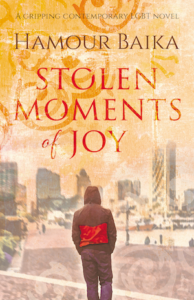An ancestry that draws hateful glances. A heart that still dreams of happiness. When his protector becomes his tyrant, can he break free?
Synopsis:
Baltimore, 2014. Abdul aches with shame. Used to bearing the brunt of people’s judgment, the Afghan immigrant can’t reconcile his love for his charming boyfriend with the bruises the man leaves on his face. So when a handsome activist’s flirtatious exchange offers solace, he goes against his beliefs and enters into a secret tryst.
Drowning in guilt over the brief affair, Abdul struggles to reset his personal compass even as a racially motivated shooting twists his adopted city into a minefield. But his firm conviction that the troubles he’s facing are fair payment for the sins of his past keeps drawing him back to his beau’s punishing fists.
Can Abdul conquer his demons and unlock his true inner strength?
Stolen Moments of Joy is a gripping contemporary LGBT novel. If you like heroes who fight to be brave, complex relationships, and thoughtful explorations of heavy topics, then you’ll adore Hamour Baika’s story of hope.
Buy Stolen Moments of Joy to find courage among chaos today!
Reviews:
An “…engaging and readable tale about escaping the bonds of the past.”
Kirkus Reviews
Stolen Moments of Joy… offers far more social and political depth than many LGBTQ stories that focus on romance and sexual maturity alone… Readers gain solid insights into this culture and realistic portrayals of relationships tested by it in a story that documents not just moments of joy, but transformation and revelation. Plenty of political insights evolve during the course of Abdul’s journey as the modern, familiar milieus of police shootings, evolving race relations, immigrant experience, and Abdul’s increasing involvement in racial struggles come to light.”
D. Donovan, Senior Reviewer, Midwest Book Review
Soundtrack:
For a selection of songs that accompany the story, please click here.
Discussion Questions
- As an immigrant, Abdul doesn’t take the race relations in the US for granted. How has he come to view them? Why is he so sensitive to them?
- Abdul has lived through some very difficult situations and moved past them. Yet, he can’t easily part with this abuser. What accounts for that?
- Abdul is nice but distant. How is it that Trilce could break down the walls he’s built around himself?
- Tyrique has a profound influence on Abdul from the first glance. Why? How does he affect Abdul’s view of himself?
- Abdul is triggered by watching dancers and performers. What is the significance of him choosing to watch the go-go dancers at the Secret night club in DC?
- Even though Niloofar and Rakesh played a significant role in safeguarding Abdul’s life, he has his own agency and ambition. Does he always act in his best interest? Why?
- Throughout the story, the story of an unjustified police shooting is unfolding and brewing in the background. In what ways does this affect the characters? Why is this event in the background?
- The police shooting leads to protests in Abdul’s adopted city. In what ways do these events align with Abdul’s internal transformation?
- How does Cliff’s gaslighting and telling Abdul contradictory stories compare with the media coverage of race issues in the US?
- Abdul is increasingly adamant about speaking against institutionalized racism. In what ways his growing empathy for other minorities influence his empathy for himself and contribute to his bolstered self-confidence?
Bonus Questions:
- At the beginning of the story, Abdul wants to go to college above all else. How do his wants transform over the story? Which secondary characters contribute most to this transformation?
- Abdul sees a disconnect between how America is and how it projects himself. How does his status as an outsider contribute to his ability to detect the paradoxes of American life?
- Though many of the characters are gay men, usual tropes of facing homophobia are mostly absent from the story. How does the intersectionality of race, class, and national origin affect the characters’ experience of homophobia?
- Abdul feels guilty about stepping out of his relationship with Cliff, despite the violence he endures. In what ways does the societal prejudgment about cheating harm his self-image?
- Abdul makes up names for those he dislikes: Two Little Terrors and Malefic Mason. But he’s unhappy that people don’t know his full name. Why is he so sensitive about this? What does that say about how he sees his own power?
- Does Abdul see himself as a victim? Does he rely on others to rescue him? How does this influence his behavior?
If you’d like me to join your meeting virtually, please contact me at hamourbaika@gmail.com.
